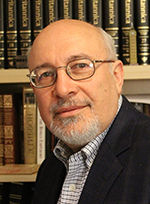Helping MLDS Continue to Evolve
Yuri Balasanov discusses his new role as deputy director and what excites him about enhancing the MLDS program during a transformational time for machine learning.
Yuri Balasanov is giddy about the rapidly evolving field of machine learning.
"No matter how we try to predict new developments, even in the short term, the reality will continue surprising us beyond the boldest expectations," he said. "We are in the epicenter of the artificial intelligence big bang. Buckle up."

Balasanov said that challenge is made easier by how the program has operated in its first decade of existence. That gives Balasanov an enviable launching point as he joins the program on a full-time basis.
Balasanov comes to the MLDS program with a wealth of academic and industry experience. He spent more than 30 years working in data science and data analytics roles, and during that time he also helped build multiple master's programs at other universities.
One of Balasanov's first focuses will be to enhance the MLDS program’s already well-established Practicum and Capstone project offerings. These courses give students valuable industry experience through projects that deliver actual recommendations and solutions to problems faced by real businesses.
Balasanov's emphasis will be on building and maintaining relationships with potential partner companies to create a diverse pool of project opportunities for students.
“This is now a critical process for any competitive program thinking about earning and maintaining its reputation, placing its students, and building reliable relationships with industry partners,” he said.
Industry connections are just one ingredient in the recipe Balasanov believes will keep MLDS at the forefront of machine learning and data science programs.
“It is a combination of strong academic background with significant attention to the industry needs,” he said. ”Many similar programs claim the same, but MLDS is among few programs that has actually achieved this.”
Balasanov also will be an active participant in teaching students. In addition to his administrative and leadership roles, he will bring his industry experience into the classroom to teach multiple MLDS courses.
That classroom experience will help him ensure the program is adapting to the rapidly changing needs of the students and the industry — even if it means adjusting his teaching material every year.
He started teaching Text Analytics in 2022. One year later, he changed almost half of the curriculum for the course, and is preparing to make similar changes in 2024.
"That is one standalone course," Balasanov said. "But the entire curriculum must be updated by moving the material within and between the courses to make room for new topics."

